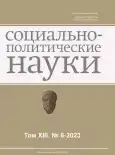The Social Contract: History and Modernity
- Authors: Zubov V.V.1
-
Affiliations:
- Financial University under the Government of the Russian Federation
- Issue: Vol 13, No 6 (2023)
- Pages: 31-40
- Section: Political Institutions, Processes and Technologies
- URL: https://bakhtiniada.ru/2223-0092/article/view/252323
- DOI: https://doi.org/10.33693/2223-0092-2023-13-6-31-40
- EDN: https://elibrary.ru/AFFODE
- ID: 252323
Cite item
Abstract
In this publication the author, using methods of analysis, description, classification, comparative approach, as well as formal-dogmatic and case-oriented methods, conducts a detailed study of the contract theory in its cross-temporal context, which allows us to establish the actual relationship between the theoretical research of thinkers of the past and the implementation of contractual principles in real political practice. It is determined that many of the postulates of the founders of the contract theory over time were favourably received by supporters of limited government power and are just as positively assessed by them now, which is expressed in the development of the idea of social contract. Reviewing the current state of a number of national political systems from the point of view of their constitutional regime, the author shows that the constitutional system of democratic societies has the idea of a social contract as a deep basis. It is noted that, although the constitutions themselves or acts of constitutional significance may not contain a reference to the contractual concept, this idea very profitably expresses the derivative nature of state power from the will, interests and needs of society. In the final section of the main part, a position is put forward according to which it is the democratic regime that is most suitable for implanting the social contract model. It is also postulated that the democratic ideal of modernity is simply unthinkable without the idea of the state as a product of an agreement between civil society and public authorities. At the end of the article it is pointed out that the design of the social contract has undergone a certain evolution since its elaboration by outstanding European thinkers, and if previously the social contract was perceived as a way of transition to the condition of a state in general, now it is interpreted much more broadly. Among other things, the author draws attention to the fact that the construction of a social contract, assumed by its authors as a universal model, is not applicable to some political systems due to their civilizational characteristics.
Full Text
##article.viewOnOriginalSite##About the authors
Vadim V. Zubov
Financial University under the Government of the Russian Federation
Author for correspondence.
Email: zubov305@yandex.ru
ORCID iD: 0000-0001-6446-3221
SPIN-code: 1747-1789
Scopus Author ID: 328437
Cand. Sci. (Hist.), associate professor, Department of Political Science, Faculty of History Science and Mass Communications
Russian Federation, MoscowReferences
- Benedict R. The сhrysanthemum and the sword: Models of Japanese culture. St. Petersburg: Nauka, 2016. 360 p.
- Weber M. Politics as a calling and profession. Moscow: Ripol Classic, 2021. 292 p.
- Hobbes T. Leviathan. Moscow: Ripol Classic, 2016. 672 p.
- Grotius G. On the law of war and peace. Moscow: Ladomir, 1994. 868 p.
- Locke J. Works in three volumes. Vol. 3. Moscow: Mysl, 1988. 668 p.
- Rousseau J.-J. Political writings. St. Petersburg: Rostock, 2013. 640 p.
- Spinoza B. Selected works. In 2 vols. Vol. 2. Moscow: State Publishing House of Political Literature, 1957. 728 p.
- Shifrin E.V. From infinity to man. Basic ideas of Kabbalah within the framework of information theory and quantum physics. Moscow: Knizhniki, 2018. 240 p.
- Kozlova E.I., Kutafin O.E. Constitutional law of Russia: Textbook. Moscow: Prospekt, 2018. 592 p.
- Marchenko M.N. Theory of state and law: Textbook. Moscow: Prospekt, 2017. 656 p.
- Plyais J.A., Brega A.V., Shatilov A.B. et al. Political science: Textbook. Ya.A. Plyais, S.V. Rastorguev (gen. eds.). Moscow: INFRA-M, 2023. 414 p.
- Gaman-Golutvina O.V., Busygina I.M., Voskresensky A.D. et al. Comparative political science: Textbook. O.V. Gaman-Golutvina (ed.). Moscow: Aspect Press Publishing House, 2018. 752 p.
- Linz J., Stepan A. Problems of democratic transition and consolidation. Baltimore; London: John Hopkins University Press, 1996. 480 p.
- Goryachev D.A. The naming of God: Apophatic and antinomic approaches. Bulletin of STOUH. Series I: Theology. Philosophy. Religious Studies. 2023. Issue 106. Pp. 9–24. (In Rus.)
- Rozhdestvenskaya E.Yu. Social contract in the era of the 90s. INTER. 2019. No. 18. Pp. 55–79. (In Rus.)
- Sedykh N.N. The limits of power in the concept of “Sovereign” by Thomas Hobbes. Education and Law. 2019. No. 4. Pp. 239–243. (In Rus.)
- Filippov A.R. Religious policy of Japan in the 15th-17th centuries in the context of centralization of power and the emergence of realistic authoritarianism. Socio-political Sciences. 2023. Vol. 13. No. 2. Pp. 36–43. (In Rus.)
- Filippov A.R., Novikov O.G. Theoretical approaches to the study of public consent. Socio-political Sciences. 2023. Vol. 13. No. 5. Pp. 13–28. (In Rus.)
Supplementary files








